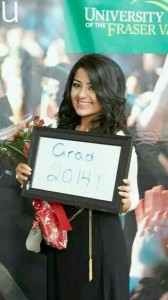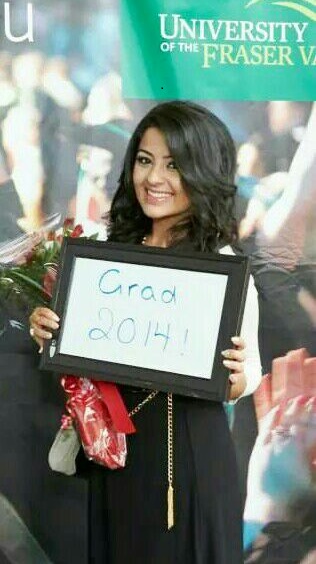
1. When did you graduate, and what did you study at UFV?
I graduated in December 2013 with a Bachelor of Arts in Sociology/Anthropology and a minor in Communications. Along the way I also completed a Liberal Arts Diploma and certificates in Business Administration and Professional Communications Essentials.
2. What is your current role, and what are the main forms of communication required of you?
I am the Communications Coordinator for the Chilliwack Division of Family Practice. This is a local non-profit organization representing family physicians in Chilliwack, Agassiz-Harrison and Hope.
I’m primarily responsible for website content management, publishing our monthly e-newsletter, managing our social media platforms and for specific events. We advertise through new and traditional media, such as newspapers and radio.
3. Why did you decide to complete a minor in Communications?
I took my first Communications classes to complete the Professional Communications Essentials Certificate. It seemed like a useful addition to my portfolio because it offered me tangible workplace skills that I could use in the “real world”.
Within the first few weeks of those Communications classes, I realized that I was learning skills that were not only highly practical but were also transferable to a variety of workplaces.
4. Can you describe a highlight from the courses you took in CMNS?
Perhaps the most daunting and the most rewarding course I took was CMNS 235, Oral Communications. Public speaking may be the one of the most common fears around, but it’s also one of the most essential skills in the workplace.
That one course not only made me a better speaker (at least I hope it did) but it helped me recognize the value of pushing boundaries and stepping out of my comfort zone for the sake of my personal as well as professional growth. It became the starting point for me to take courses that I knew were going to particularly challenge me.
That experience helped me tackle learning design for print and online medi,a and I also collaborated with a UFV section to produce communication plans for a project they were working on.
5. With the wisdom of hindsight and experience, what communication-related advice would you offer current UFV students as they prepare for graduation and/or employment?
Diversify your skill set. Whether you’re majoring in Sciences, Business or Arts, learning how to communicate gives you the ability to highlight your strengths. Related to that—networking is key. I know it’s a cliché, but it’s a cliché for a reason.
Networking is often made out to be a set of abstract and elusive skills, but it’s really not. Talk to your professors, attend job fairs and ask friends and family. I was lucky enough to get my first break from a professor’s recommendation. My experience provides a case in point example of the power of others vouching for your abilities.
6. Is there an aspect of communication you would like to see added or covered in greater depth at UFV?
I would love to see more of the technical courses being offered, especially in video production and website management.
I also think integrating work experience through practicum courses more fully into the Communications program would be valuable. It’s a way for students to obtain work experience that fresh graduates need to make themselves attractive candidates for employment.
7. What is the one communications-related skill you feel is most valuable to you in the workplace?
Strategic planning is essential—along with everyday communication. We need to step back and ask “How does this particular communication activity fit into what our overall goals and objectives are?”
It’s easy to get mired in the minute details so it’s a question of striking the balance between getting through the daily checklist but also evaluating what we’re doing and how this contributes to the bigger picture. The evaluative work then feeds back into fine-tuning the strategic communications plans.
Many thanks, Asma, for taking the time to respond to our questions. We’re happy to see that you have found success, and that your career path has kept you with us in the Fraser Valley.

